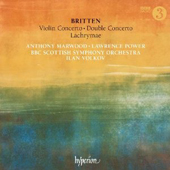
ESSENTIAL RECORDINGS

Benjamin Britten, along with Shostakovich, was preeminent among
mid-twentieth Century composers. He will probably be best remembered in
the long term for his operas, particularly Peter Grimes, The Turn of the
Screw and Billy Budd, but his oeuvre also includes a richness of other
vocal works and a not insubstantial number of instrumental ones. Here we
have a collection of two concertos and the concerto-like Lachrymae.
Written in 1939 while the then twenty-six year old composer was staying
in Joliette, Québec, Britten's Violin Concerto is one of the glories of
the twentieth-century concerto repertoire. It has been slow in achieving
popularity. As recently as twenty years ago, the only important
recording of it was Ida Haendel's on EMI. Without a doubt, that
recording remains among the best, but it has had some credible
competition in recent years. Janine Jansen's recording, coupled with a
decent account of the Beethoven Violin Concerto, springs to mind. (These
two concertos have one striking similarity: each begins with a timpani
solo which defines the rhythmic pulse of much of the music to follow.)
The concerto is in three movements, the first dominated by a nervous
tango-like rhythm. The second is a kind of scherzo that culminates in a
cadenza which, in turn, introduces the passacaglia third movement. The
entire work is intensely emotional, especially the passacaglia. It
expresses a desolation that at times becomes almost ecstatic.
Violinist Anthony Marwood goes at the score with fervor. His tone
tends toward the steely which often heightens the sense of alienation
intrinsic to the work. This factor will not appeal to everyone and the
performance would not be a first recommendation, fine though it is in
most respects. The orchestral playing under the baton of Ilan Volkov is
right on the same emotional pitch as the soloist's.
But the CD would be worth acquiring for the less familiar works it
includes. The Double Concerto for violin, viola and orchestra is a
curiosity. It was written when the composer was only nineteen and a
student under composer John Ireland. (Britten under Ireland has a
curious ring to it, don't you think?) The composer put it aside once it
was completed and it was not performed until 1997, twenty-one years
after his death. It is far from a masterpiece, yet Britten fans will
certainly enjoy it for its hints of things to come. The performance is
committed and expert, giving this concerto as fair a hearing as you're
likely to encounter.
Lachrymae is a set of oblique variations, or reflections, on a song of
Dowland, "If my complaints could passion move". Originally for viola and
piano, the composer orchestrated it in 1976, just months before his
death. It is a spare work, initially enigmatic but coming together in a
satisfying manner in the later pages of the score. Violist Lawrence
Power evinces a natural sympathy for the music and, as before, conductor
Volkov and the BBC Scottish Symphony Orchestra do their part with élan.
Richard Todd - May 2012